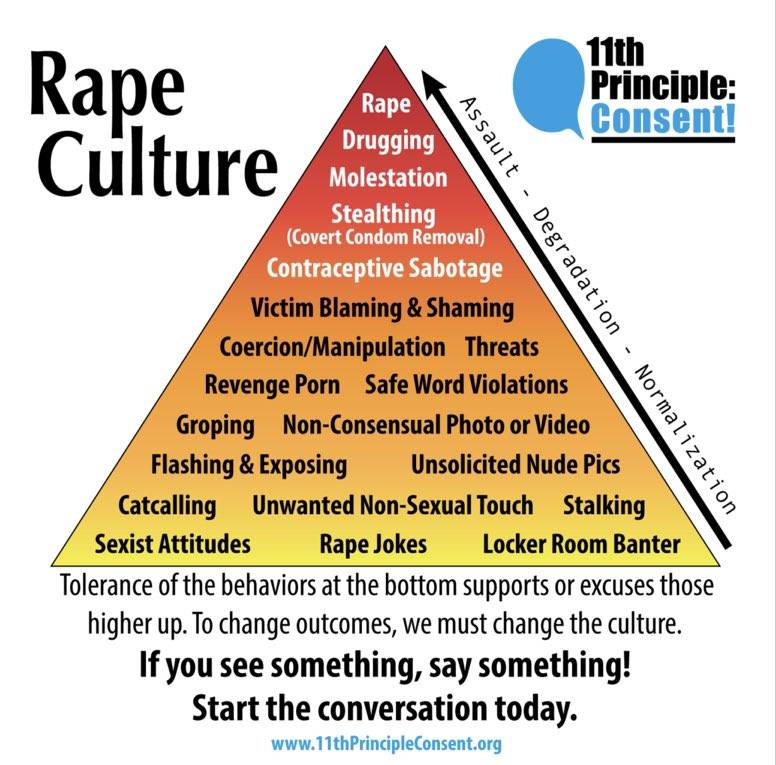Rape culture is a culture where social attitudes and institutional systems treat sexual assault as normal, trivial, or even expected, thereby enabling sexual assault to be committed with more frequency and without consequence.
Rape culture enablement takes many forms.
1. VICTIM BLAMING
It blames the victims for what is done to them and treats rape as a problem to be solved through improving the behavior of potential rape victims, rather than improving the behavior of potential rapists.
The underlying belief here is that rape is a normal part of life, and if you don't protect yourself from it, then you deserve it.
Victim blaming marginalizes the victim/survivor and makes it harder to come forward and report the abuse leading to underreporting.
It is NOT the victim’s fault or responsibility to fix the situation; it is the abuser’s choice.
By participating in victim blaming, society enables the abuser to perpetrate sexual assault or relationship abuse while avoiding accountability for actions.
2. PUTTING THE BURDEN ON WOMEN TO PREVENT RAPE
Putting the burden of safety on women's shoulders and blaming them when they don't succeed is rape culture enablement.
Policing women’s sexuality—or attire, or appearance—has never protected from harm.
Rape and defilement victims have ranged from toddlers through animals to aged and dead people and it should raise questions that the lectures on rape prevention have something wrong with them.
We are teaching people that boys/men are natural aggressors who always want sex and that the onus is on girls/women to keep boys'/men's own unrelenting urges in check.
3. OBJECTIFYING WOMEN
Society views women as receptacles of male sexual entertainment, humour and service that men are entitled to for exploitation since women exist for these things FOR men – instead of seeing women as equal human beings with rights over who can and cannot access their bodies.
And if they're seen as these objects FOR male consumption rather than humans, it makes sexually assault against women prevalent.
Foul degrading language is used when describing women’s bodies and women in general, example in song lyrics, or men saying they can’t be friends with women without sex.
When people use this kind of language, it teaches that women are objects of sexual consumption for men and that it's okay to not respect or rate them outside that domain
4. SLUT SHAMING AND PURITY CULTURE
"Women must cover up or be risk getting threatened" narratives enables rape culture and offsets responsibility of rape from the rapist who chose to use force to take what the rapist wanted on the victim
Purity culture and slut shaming validates people who say that women "ask for it" by wearing revealing clothing or having a lot of sexual partners.
Shaming female sexuality not only spins the false yarn that female sexuality is pathological; it parrots an even greater lie that men are naturally hypersexual, have no agency over their urges and can't be helped by anything once they desire or are aroused – men's sexual urges are dangerously capable of clouding cognition and logic.
5. RAPE JOKES
Up
Rape is never a funny punchline or content for memes.
What does joking about such a serious issue say about recognizing sexual assault as a violent act?
Direct use of rape for jokes in the name of dark humour desensitizes both men and women to the reality of sexual violence as something wrong to treat
6. UNWILLINGNESS AND/OR INABILITY TO PUNISH RAPISTS AND SEXUAL ASSAULT
Notions of “real rape” has created a stereotypical perfect victim who deserves justice, excluding victims that don’t fit into it. It is a victim who has not been drinking or behaving in a ‘sexually provocative manner’, and immediately reports to law enforcement and supported by ample physical evidence, etc. Hospital staff, police, schools and institutions, and the legal systems have adopted this view and fail to push for justice for all victims.
7. INFLATING FALSE RAPE REPORT STATISTICS.
There is much greater emphasis on the danger that injustice will be done to the defendant, than there is in prosecutions of the true rape cases.
One is more likely to be falsely convicted of murder than rape. Men who have an “irrational fear of being falsely accused of rape,” are aware that they — or men they know, love, and respect — are guilty of participating in behaviour that violates consent, and are operating on that ingrained guilt.
8. HYPER MASCULINITY
From a young age, boys are taught to be dominant, and if their masculinity is threatened in any way (say, if someone says “no” to them), they’re to get aggressive, coercive or forceful to dominate and get their way.
That a man's apparent masculinity is "threatened" or "affronted" is shamed.
This culture is also the underlying reason discouraging males to own up to their defilement or assault.
Rape culture is enabled primarily by toxic masculinity and toxic femininity, both being flip sides of a patriarchal coin.




No comments yet
Be the first to share your thoughts!